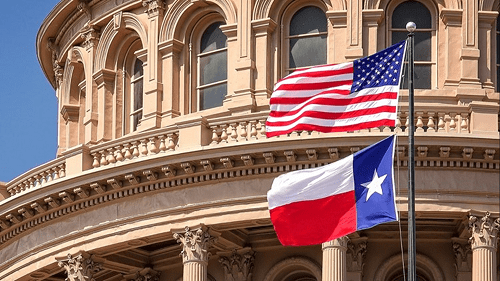
1.18.22 – Austin American Statesman
January has brought a final flurry of new Texas laws, including limits on transgender student athletes and a ban on cruel restraints for dogs, that were approved by lawmakers last year.
The transgender athlete law, which took effect Tuesday, was among the most divisive bills considered by lawmakers in 2021 — failing to gain passage during the 140-day regular session that ended in May, the first special session that ended with no bills passed due to a quorum break by House Democrats, and an abbreviated second special session when quorum was re-established after a two-week delay.
It took until the closing days of the third special session for final passage of House Bill 25 in October.
During hours of emotional floor debate and several late-night committee hearings, opponents called the legislation a dangerous foray into discrimination that addressed a nonexistent problem — sacrificing already vulnerable transgender youths to push a political culture war.
“There is not one case — not one case — of a trans girl taking a competitive spot from a female student in Texas,” state Rep. Ann Johnson, D-Houston, said during the final floor debate in the House.
But Republicans and religious conservatives supported the bill, which requires students to compete based on the “biological sex” listed on their original birth certificate, saying it was needed to preserve competitive fairness and safety.
Texas athletic officials had already required students to compete based on birth certificates. HB 25 expanded that rule’s reach by forbidding the use of documents amended to reflect a student’s gender identity.https://774995ee2b9c1c190053c8009445f539.safeframe.googlesyndication.com/safeframe/1-0-38/html/container.html
New Texas dog law bans chains in certain situations
Another law that took effect Tuesday also had a circuitous path to passage.
Senate Bill 5 prohibits tethering unattended dogs outdoors unless they’re given clean water, adequate shelter and protection from excessive animal waste. The law also bans restrictive restraints such as heavy chains, collars that impede breathing and leashes that are less than 10 feet long or five times the dog’s length.https://774995ee2b9c1c190053c8009445f539.safeframe.googlesyndication.com/safeframe/1-0-38/html/container.html
Gov. Greg Abbott surprised bill supporters by vetoing a similar measure after the regular session, saying its provisions amounted to “micromanaging and overcriminalization” because animal cruelty laws already protect dogs.
After sharp criticism from dog lovers, Abbott added the topic to the third special session with requested tweaks, which were made by lawmakers.Your stories live here.Fuel your hometown passion and plug into the stories that define it.Create Account
“We have fought for many years to pass this law and are absolutely thrilled about the difference it is going to make in the lives of dogs as well as Texas residents,” said Stacy Sutton Kerby with the Texas Humane Legislation Network.
Violations can bring a fine of up to $500, while those with a previous conviction for illegal restraint can get up to 180 days in jail.
The law does not apply to hand-held leashes while walking a dog.
Laws authorize usage of funds, redistricting boundaries, and more
Other laws taking effect Tuesday included:
- SB 52, which authorized more than $3 billion for research buildings, health facilities and other projects at public universities and health institutions across Texas.
- SB 1, which would use surplus state revenue to lower school district property taxes this year.
- Three bills that set new political boundaries for the U.S. House, Texas House and Texas Senate. All three redistricting maps have been challenged as unconstitutional by Democrats and civil rights groups.
The new laws join two dozen regular-session laws that took effect when January began, the most notable of which requires counties with at least 1 million residents to seek voter approval via an election if county officials cut law enforcement funding.
Supporters said the measure was needed to show support for law enforcement and to counter “defund the police” movements, while opponents said it infringed on the ability of local leaders to meet specific budget and policing needs.
Jan. 1 also brought changes for state restaurants, which were given protection from predatory third-party delivery apps under SB 911, and for residential renters, who must be informed before leasing a property that is in a 100-year floodplain or had flooded in the previous five years.https://774995ee2b9c1c190053c8009445f539.safeframe.googlesyndication.com/safeframe/1-0-38/html/container.html
Owners of disabled veteran specialty license plates will need a placard with the international symbol of access to park in restricted parking spaces, though SB 792 allows for new plates to also depict the symbol.
The Legislature’s next scheduled round of lawmaking begins with the regular session in January 2023.
Thus far, Abbott has not called lawmakers back for a fourth special session, though several conservative Republicans are pressing to take another crack at banning businesses and local governments from imposing COVID-19 vaccine mandates — a topic Abbott added to the third special session without success.
Only the governor can call a special session and determine what topics lawmakers may consider.
